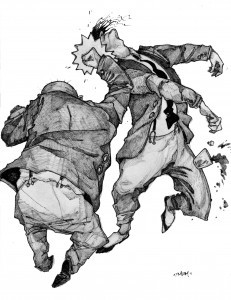news
Where Have All The Good Literary Feuds Gone?

The history of literature is littered with blood spatters and broken noses. Ben Jonson, Alexander Dumas and Marcel Proust fought duels. Alexander Pope slipped a pirate bookseller an emetic. The Earl of Rochester was suspected of hiring thugs to beat John Dryden.
But the sad truth, as I discovered researching Writers Gone Wild is that authors don’t get into nearly as much trouble as they used to.
It was a time when Ernest Hemingway traded punches with Wallace Stevens on a Key West dock after Wallace had humiliated Hemingway’s sister at a party. Not that Ernest needed an excuse to knock anyone down, but this was more ennobling than wrestling a critic on his editor’s desk at Scribner’s about a negative review.
Then there was the time Theodore Dreiser slapped a drunken Sinclair Lewis after Lewis called him a “son of a bitch who stole three thousand words from my wife’s book” at a literary dinner. That slap, fueled not only by alcohol, but Lewis’ suspicion that Dreiser had also slept with his wife, made national headlines.
And then there’s Norman Mailer. He would have filled a chapter in my book, but pressed for space, I resorted to reciting his record: against Bruce Jay Friedman (a victory against Friedman, a draw against Friedman’s Jaguar); songwriter Jerry Leiber (stopped by the restaurant owner); and Gore Vidal (two bouts, two KOs, but losing the rematch on points to Vidal’s verbal riposte: “Words fail Norman Mailer yet again.”).
When the most violent attack in recent years was Richard Ford goobering Colson Whitehead at a Poet & Writers party, the mystery is: why?
There’s not enough drinking
There was a time, boys and girls, when a well-stocked liquor cabinet was a vital home accessory. It was an era when saying hello was followed with, “How about a drink?” Drunkenness was not only acceptable, it was funny (scholars would wish to consult the works of Mr. Foster Brooks on YouTube for further information).
Alcohol also had the benefit, apart from being delicious, of reducing inhibitions, making it easier to react to a critical slight with a roundhouse. Strong spirits also dulled the nerve endings. The effects of a Maileresque head-butt could be delayed until tomorrow, leaving time for more drinking.
Nowadays, the bottles have been capped. Getting tanked is seen as something that needs to be cured instead of fed with highballs. Without alcohol sloshing their brains, authors have retained enough self-control to avoid fisticuffs, which make literary parties much duller.
Everyone’s living too far apart
Once, an ambitious writer had to move to the big city where the publishers and agents nested. English writers headed for London, while American writers hungered for New York, Chicago or San Francisco. Minneapolis was the burg you fled, not where you went to write for Garrison Keillor.
Not surprising, such crowding causes insane behavior. In psychologist John B. Calhoun’s 1962 experiments, despite the presence of sufficient food and water, rats in confined spaces, such as your typical Brooklyn apartment, resorted to rape, infanticide and cannibalization. Put writers in the same situation, competing for the same resources ─ magazine space, book contracts, MacArthur Foundation genius grants ─ and you get fighting in the streets (J.P. Donleavy vs. Brendan Behan), shoving matches at Elaine’s (Mailer, again) and snarky reviews in The New York Times Book Review.
Nowadays, a writing career can be sustained anywhere, and as more MFA-trained authors moved out of the cities and onto university campuses, prospects declined of entertaining dust-ups.
Everyone has to play nice
The Japanese say the tallest nail gets hammered first. Whether from your agent, your publisher or that big-name writer’s marketing seminar, the advice is the same: be positive. Don’t give a bad review to Gary Shteyngart. Don’t tease Caroline Leavitt on your Facebook page. Don’t even think about using that deliciously nasty crack about Michael Dirda in your email unless you want to see it in tomorrow’s GalleyCat.
Failing to heed this advice, we’re told, can have serious consequences. That poet you parodied at the n+1 party might be considering you for an anthology. The travel writer you nailed on Google+ was about to recommend you to Vanity Fair’s Hot Type column. The woman whose novel you 1-starred on Amazon has connections with the Hay Festival.
An IBM middle manager in 1957 was more rebellious than a contemporary writer.
So, until the economy collapses, rising gas prices kills travel and the Internet gets taken down by hackers and the flood of Kindleized self-published novels, writers have had to find new battlegrounds. When Katie Roiphe criticized Michael Chabon’s novel The Mysteries of Pittsburgh, his wife Ayelet Waldman shouted back, “Guess what bitch? He not only writes rings and rings and rings around you, but the same rings around your drunken literary love objects.”
On Twitter.
***
–Bill Peschel has long wanted to write a book, but instead delivered bread, developed computer games, acted in a Mel Gibson movie and committed journalism. After exhausting those options, he wrote Writers Gone Wild (Penguin) and self-published The Complete, Annotated Whose Body? He lives in Hershey, Penn., where the air smells like burnt chocolate sometimes.
Original artwork by: Matt McCann whose work can be seen at www.cannedmatt.com









